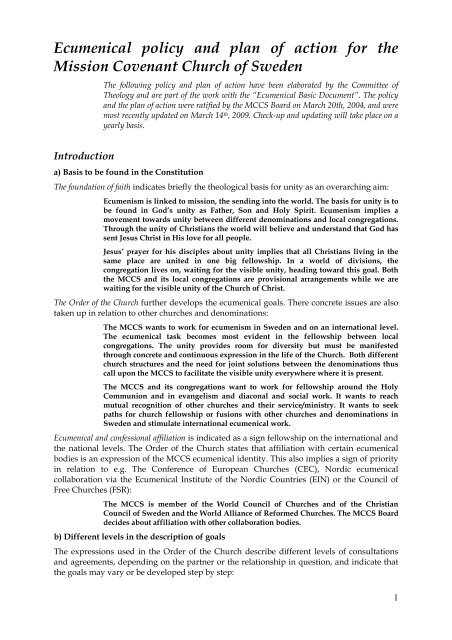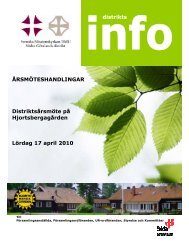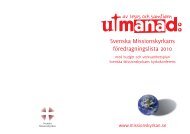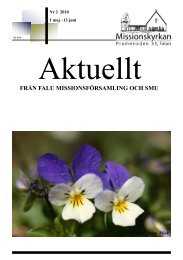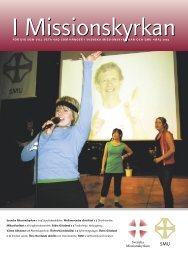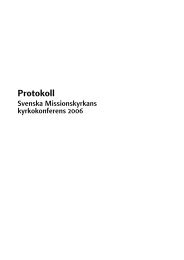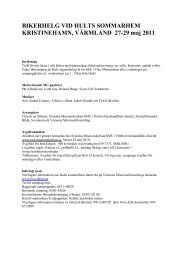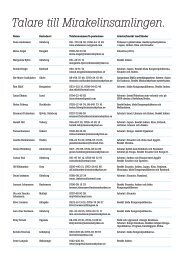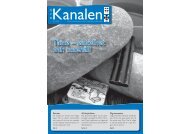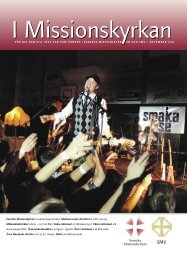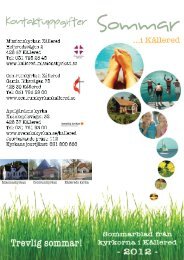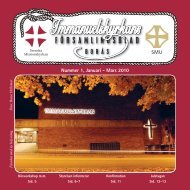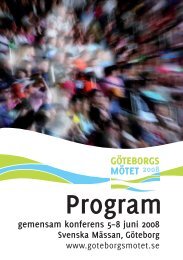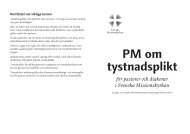Ecumenical policy and plan of action for the Mission Covenant ...
Ecumenical policy and plan of action for the Mission Covenant ...
Ecumenical policy and plan of action for the Mission Covenant ...
You also want an ePaper? Increase the reach of your titles
YUMPU automatically turns print PDFs into web optimized ePapers that Google loves.
Measures <strong>and</strong> schedule:Current examples <strong>and</strong> advice should be provided continually on <strong>the</strong> web site <strong>of</strong> eachrespective Church. The Youth Sections consultations on local work in e.g. partner Churchesshould be encouraged.Work on long term <strong>the</strong>ological issues continues on <strong>the</strong> basis <strong>of</strong> <strong>the</strong> areas taken up by <strong>the</strong>background document <strong>and</strong> <strong>the</strong> answers from <strong>the</strong> various instances e.g.:• The view <strong>of</strong> <strong>the</strong> Congregation <strong>and</strong> <strong>the</strong> Church <strong>and</strong> its practical implementation on a local level• The Ministry issue, remaining issues, but also <strong>the</strong> promise to continue <strong>the</strong> consultations on <strong>the</strong> episcopacy.• Deepening <strong>of</strong> <strong>the</strong> work in relation to baptism confirmation – baptism renewal, ultimately consultations on childblessing <strong>and</strong> <strong>the</strong> joint issue <strong>of</strong> non baptized membersThe Council <strong>of</strong> Consultation should initiate recurrent <strong>the</strong>matic days or seminars on issues <strong>of</strong>collaboration <strong>and</strong> joint <strong>the</strong>ological issues on a national <strong>and</strong>/or a regional level.c) Stockholm Catholic DioceseGoals:To take up issues <strong>of</strong> common interest e.g. in our capacity as minority churches <strong>and</strong> inrelation to society. To stimulate local exchange <strong>and</strong> collaboration in a number <strong>of</strong> places.Agreements between <strong>the</strong> churches can be made in relation to certain <strong>the</strong>ological <strong>and</strong> pastoralissues.Situation:The final drafting <strong>of</strong> <strong>the</strong> document <strong>Ecumenical</strong> marriages has been accomplished, but it is notyet published. A document has been elaborated <strong>and</strong> adopted.Measures <strong>and</strong> schedule:Consultations started in 2006 concerning <strong>the</strong> meeting with o<strong>the</strong>r religions in multi-culturalSweden. The publication Samtal över gränserna (Consultations across frontiers) has beenpublished <strong>and</strong> sent out to <strong>the</strong> congregations.Parting from <strong>the</strong> acceptance <strong>of</strong> baptism, new areas are being sought <strong>for</strong> where <strong>the</strong> call tounity can be made visible.d) The Swedish Alliance <strong>Mission</strong> (SAM)Goals:To follow out <strong>the</strong> existing contacts with openness <strong>for</strong> possible closer relations in <strong>the</strong> future.The consultations between <strong>the</strong> Methodist Church, <strong>the</strong> Swedish Baptist Union <strong>and</strong> <strong>the</strong> MCCSare continuously presented to SAM in openness <strong>for</strong> <strong>the</strong> possibility <strong>of</strong> extension.Situation:Regular contacts are taking place between SAM <strong>and</strong> <strong>the</strong> MCCS district <strong>of</strong> Östra Götal<strong>and</strong>.Consultations on e.g. joint congregations are held. The process in which <strong>the</strong> MCCS findsitself not only vis-à-vis <strong>the</strong> Church <strong>of</strong> Sweden but also <strong>the</strong> Methodist Church <strong>and</strong> <strong>the</strong>Swedish Baptist Union does not imply a deterioration <strong>of</strong> relations with SAM. Thedevelopment is followed with satisf<strong>action</strong>. In<strong>for</strong>mal regular contacts continue on <strong>the</strong> churchlevel.Measures:Continual contacts in congregational <strong>and</strong> pastoral issues, particularly in <strong>the</strong> district <strong>of</strong> ÖstraGötal<strong>and</strong>, <strong>and</strong> when so required, with <strong>the</strong> MCCS on a national level. Continual in<strong>for</strong>mationabout <strong>the</strong> consultations between <strong>the</strong> Methodist Church, <strong>the</strong> Swedish Baptist Union <strong>and</strong> <strong>the</strong>MCCS.4
e) O<strong>the</strong>r denominationsGoals:Collaboration <strong>and</strong> encounters should take place primarily via <strong>the</strong> Christian Council <strong>of</strong>Sweden (SKR). There must be openness <strong>for</strong> new bilateral dialogues.Situation:In connection with <strong>the</strong> creation <strong>of</strong> some joint congregations, consultations have been held,something which is also valid <strong>for</strong> <strong>the</strong> norms in relation to temporary ”lending” <strong>of</strong> pastors<strong>and</strong> transfer. Wishes have earlier been expressed not only as continual consultations inquestions that may arise, but also in relation to continued consultations in an <strong>of</strong>ficial group<strong>of</strong> consultations. Suggestions concerning a joint congregation order <strong>and</strong> joint statutes havebeen worked out <strong>and</strong> coordinated in <strong>the</strong> working party <strong>of</strong> <strong>the</strong> Council <strong>of</strong> Free Churches(FSR) in relation to joint congregations.Agreements about proceedings at <strong>and</strong> instructions not only <strong>for</strong> a temporary post but also <strong>for</strong>transfer to post within ano<strong>the</strong>r denomination are at h<strong>and</strong> in relation to <strong>the</strong> MethodistChurch, <strong>the</strong> Swedish Baptist Union, <strong>the</strong> Swedish Alliance <strong>of</strong> <strong>Mission</strong>, Interact <strong>and</strong> <strong>the</strong>Pentecostal movement.Measures:To follow up <strong>and</strong> give advice to local congregations at consultations about collaboration orfusion on <strong>the</strong> basis <strong>of</strong> FSR material <strong>and</strong> to consult with <strong>the</strong> denominations concerned.To take up <strong>the</strong>se agreements when so required in <strong>the</strong> local congregations <strong>and</strong> see to it thatagreements are drafted in every case <strong>of</strong> employment by pastor or o<strong>the</strong>r person qualifiedwithin ano<strong>the</strong>r denomination. The district supervisor is primarily responsible <strong>for</strong> doing this.2. Local collaborationa) Local ecumenical councilsGoals:To stimulate <strong>the</strong> active participation <strong>of</strong> <strong>the</strong> congregations in <strong>the</strong> local ecumenical ef<strong>for</strong>ts <strong>and</strong>to work <strong>for</strong> a broad ecumenical collaboration in that context. “Churches toge<strong>the</strong>r”, both inrelation to joint worship services, evangelism, diaconal work, school work, <strong>and</strong> in spiritualcare within health <strong>and</strong> medical care <strong>and</strong> criminal care.Measures:Primarily through <strong>the</strong> Christian Council <strong>of</strong> Sweden (SKR) work <strong>for</strong> stimulation <strong>of</strong> localecumenical councils on one h<strong>and</strong> <strong>and</strong> transmit results <strong>of</strong> studies which could open ways <strong>for</strong>local ecumenism on <strong>the</strong> o<strong>the</strong>r h<strong>and</strong>, <strong>and</strong> also point to <strong>the</strong> possibilities <strong>of</strong> deepercollaboration, especially in worship service, between some congregations within <strong>the</strong> localecumenical fellowship.b) Joint congregationsGoals:To elucidate <strong>the</strong> implication <strong>of</strong> a joint congregation, to give advice <strong>and</strong> examples <strong>and</strong> t<strong>of</strong>acilitate <strong>the</strong> process <strong>of</strong> joint <strong>action</strong> on <strong>the</strong> basis <strong>of</strong> <strong>the</strong> material produced by <strong>the</strong> FSR, What toconsider <strong>for</strong> joint congregations. In each situation an appreciation should be made as to <strong>the</strong>future church/denomination participation. Alternative <strong>for</strong>ms <strong>of</strong> double/triple participationare accounted <strong>for</strong> in this material.5
Situation:Three kinds <strong>of</strong> joint congregations are at h<strong>and</strong> today: First, historical ones, congregationswhich from <strong>the</strong> beginning were doubly affiliated, secondly congregations which werecreated during <strong>the</strong> 1970s, mostly on <strong>the</strong> basis <strong>of</strong> <strong>the</strong> constellation <strong>the</strong> Methodist Church, <strong>the</strong>Swedish Baptist Union <strong>and</strong> <strong>the</strong> MCCS <strong>and</strong> thirdly, from 1980 <strong>and</strong> onwards, in widerconstellations, sometimes resulting in a weakened relationship with <strong>the</strong>churches/denominations. Local fusions are a sign <strong>of</strong> a wish <strong>and</strong> possibilities <strong>of</strong> unity <strong>and</strong> achallenge <strong>for</strong> a wider <strong>for</strong>m <strong>of</strong> unity. Simultaneously this means that in case <strong>the</strong>churches/denominations remain, <strong>the</strong> joint resources might be weakened <strong>and</strong> <strong>the</strong>congregation runs <strong>the</strong> risk <strong>of</strong> just being a local one.3. <strong>Ecumenical</strong> <strong>and</strong> confessional bodies <strong>and</strong> o<strong>the</strong>r national <strong>and</strong>international <strong>for</strong>ms <strong>of</strong> collaborationa) The Christian Council <strong>of</strong> Sweden (SKR)Goals:The Christian Council <strong>of</strong> Sweden has top priority in <strong>the</strong> MCCS ecumenical commitment.Joint <strong>action</strong> with <strong>the</strong> “Churches Toge<strong>the</strong>r” with all, or alternatively in <strong>the</strong> <strong>for</strong>m <strong>of</strong> networkingis given priority be<strong>for</strong>e our own programmes.Measures:Continued active participation not only in Board work, principal activities <strong>and</strong> <strong>the</strong>ologicalworking parties but also in such networking that lies near <strong>the</strong> MCCS ambition in variousissues. The Christian Council <strong>of</strong> Sweden should <strong>the</strong>re<strong>for</strong>e be given high priority as to budgetconsiderations <strong>and</strong> staff participation. The MCCS should work actively <strong>for</strong> <strong>the</strong> ongoing work<strong>of</strong> ecclesiology.The MCCS should actively influence a change <strong>of</strong> <strong>the</strong> current dividing up within <strong>the</strong> ChristianCouncil <strong>of</strong> Sweden <strong>of</strong> church families. The MCCS is represented in <strong>the</strong> FRS <strong>and</strong> works infavour <strong>of</strong> its organizational extent being kept at a low level <strong>for</strong> <strong>the</strong> benefit <strong>of</strong> <strong>the</strong> ChristianCouncil <strong>of</strong> Sweden.b) The World Council <strong>of</strong> Churches (WCC)Goals:To take an active part in <strong>the</strong> WCC work not only via <strong>the</strong> representatives <strong>of</strong> <strong>the</strong> MCCS butalso via an exchange <strong>of</strong> ideas <strong>and</strong> inspiration. To support <strong>the</strong> development assistancecollaboration within <strong>the</strong> WCC.Situation:After <strong>the</strong> General Assembly in Porto Alegre, <strong>the</strong> MCCS has regained a seat in <strong>the</strong> CentralCommittee, in <strong>the</strong> Executive Committee <strong>for</strong> World <strong>Mission</strong> <strong>and</strong> in <strong>the</strong> Commission <strong>for</strong><strong>Ecumenical</strong> training. Thereby <strong>the</strong> earlier MCCS goal, to act <strong>for</strong> <strong>the</strong> regaining <strong>of</strong> <strong>the</strong> directMCCS commitment within different WCC bodies, has been fulfilled.The MCCS has its own development assistance cooperation with <strong>the</strong> WCC via <strong>the</strong>International Department <strong>and</strong> during 2006, it acquired <strong>the</strong> status <strong>of</strong> observer as a memberorganization among ”Specialized Ministries” which means that <strong>the</strong> interface with <strong>the</strong> WCChas been enlarged.6
Measures:To maintain <strong>the</strong> close contact with <strong>the</strong> WCC work in its different <strong>for</strong>ms, especially in relationto <strong>the</strong> development within ecumenical <strong>the</strong>ology (Faith <strong>and</strong> Order). To follow <strong>the</strong> work <strong>of</strong> <strong>the</strong>Central Committee, <strong>the</strong> World <strong>Mission</strong> <strong>and</strong> <strong>the</strong> Commission <strong>for</strong> <strong>Ecumenical</strong> Training via <strong>the</strong>MCCS representatives since 2006 in <strong>the</strong>se bodies. This implies responsibility <strong>for</strong> <strong>the</strong>Commission <strong>of</strong> Theology to closely follow <strong>the</strong> issues to be able to give support to <strong>the</strong>representatives.To <strong>plan</strong> <strong>for</strong> a long term adaptation <strong>of</strong> coming generations to an international ecumenicalcommitment. To maintain <strong>the</strong> close collaboration with <strong>the</strong> Church <strong>of</strong> Sweden in relation toimportant issues in <strong>the</strong> WCC <strong>and</strong> <strong>for</strong> general <strong>policy</strong>, e.g. through a network with <strong>the</strong>Christian Council <strong>of</strong> Sweden.To coordinate <strong>the</strong> ecumenical contacts with <strong>the</strong> WCC <strong>and</strong> <strong>the</strong> development assistancecollaboration.To <strong>plan</strong> <strong>for</strong> young people’s participation as stewards, youth delegates <strong>and</strong> <strong>the</strong>ir ecumenicaltraining at <strong>the</strong> Bossey Institute. To continue <strong>the</strong> collaboration with <strong>the</strong> Church <strong>of</strong> Sweden<strong>and</strong> to work within <strong>the</strong> network <strong>of</strong> <strong>the</strong> Christian Council <strong>of</strong> Sweden in favour <strong>of</strong> issuesrelated to <strong>the</strong> WCC <strong>and</strong> <strong>the</strong> CEC. To participate actively in a Nordic coordination <strong>of</strong> <strong>the</strong>WCC <strong>and</strong> <strong>the</strong> CEC collaboration. To carry out coordination between <strong>the</strong> contacts related toecumenical work <strong>and</strong> to development assistance vis-à-vis <strong>the</strong> WCC.c) The Conference <strong>of</strong> European Churches (CEC)Goals:To follow <strong>the</strong> ongoing work within <strong>the</strong> European Christian churches <strong>and</strong> when <strong>the</strong> resourcesso permit participate in various conferences. To work <strong>for</strong> an MCCS presence at least in oneCommission or working party.Situation:Compared to <strong>the</strong> WCC <strong>and</strong> <strong>the</strong> WARC, <strong>the</strong> commitment <strong>for</strong> <strong>the</strong> CEC is <strong>of</strong> lower priority.There are however important fields to follow up in relation to <strong>the</strong> Christian churches inEurope. Particularly <strong>the</strong> work with Charta Oecumenica has given ecumenism in Swedenimportant impulses. Since 2003 <strong>the</strong> MCCS is represented in <strong>the</strong> Commission <strong>for</strong> Church <strong>and</strong>Society.Measures:Support our representative in Church <strong>and</strong> Society. Consult with o<strong>the</strong>r Swedish churchesabout <strong>the</strong> CEC within a Christian Council <strong>of</strong> Sweden network. Continually follow <strong>the</strong> issuestaken up by <strong>the</strong> CEC <strong>and</strong> on every occasion consider participation at <strong>the</strong> conferencesorganized.d) The World Alliance <strong>of</strong> Re<strong>for</strong>med Churches (WARC) – on a global level <strong>and</strong> in EuropeGoals:To create - with <strong>the</strong> help <strong>of</strong> belonging to a confessional church family - conditions <strong>for</strong>contacts <strong>and</strong> exchange with separate churches in different countries, especially in Europe<strong>and</strong> to make use <strong>of</strong> experiences <strong>of</strong> church fellowship <strong>and</strong> church union that many <strong>of</strong> <strong>the</strong>sechurches have. To work <strong>for</strong> <strong>the</strong> maintaining <strong>of</strong> <strong>the</strong> organizational extent <strong>of</strong> <strong>the</strong> WARC on alow level to <strong>the</strong> benefit <strong>of</strong> <strong>the</strong> WCC. Continued representation, among o<strong>the</strong>r things throughparticipation in <strong>the</strong> Executive committee. The WARC prepares a fusion with ano<strong>the</strong>rre<strong>for</strong>med organization, namely <strong>the</strong> Re<strong>for</strong>med <strong>Ecumenical</strong> Council, <strong>and</strong> is expected to <strong>for</strong>mwith that organization a World Communion <strong>of</strong> Re<strong>for</strong>med Churches in 2010.7
Situation:Since <strong>the</strong> creation <strong>of</strong> <strong>the</strong> WARC, <strong>the</strong> MCCS has entertained close personal contact in differentbodies <strong>and</strong> <strong>the</strong> MCCS is represented in <strong>the</strong> Executive committee.Measures:To support our representative in <strong>the</strong> WARC executive committee. Develop bilateral contactswith member churches within WARC/Europe, in <strong>the</strong> Baltic States <strong>and</strong> in Pol<strong>and</strong>, especiallythrough <strong>the</strong> MCCS Europe Committee. Follow <strong>the</strong> <strong>the</strong>ological work within <strong>the</strong> WARC.e) The International Federation <strong>of</strong> Free Evangelical Churches (IFFEC)Goals:To maintain <strong>the</strong> relations which have been created historically above all between Europeanmember churches. To give special support <strong>the</strong> small minority churches in <strong>the</strong>ir situation. Todevelop collaboration <strong>and</strong> exchange on <strong>the</strong> Nordic level, especially in relation to missionwork in o<strong>the</strong>r countries.Situation:The MCCS holds <strong>the</strong> post <strong>of</strong> General Secretary since 2006. The General Assembly (2006) <strong>and</strong><strong>the</strong> conference <strong>of</strong> <strong>the</strong>ologians (2008) are held every four years.Measures:Participation in IFFEC meetings when <strong>the</strong> resources so permit, continually keep <strong>the</strong> Nordiccontacts, especially where mission collaboration is concerned.f) Nordic collaboration - EINGoals:The MCCS shall participate actively in <strong>the</strong> Nordic-Baltic ecumenical work (EIN) <strong>and</strong> work<strong>for</strong> its promotion not only through <strong>the</strong> national Christian councils but also throughinterested churches, among o<strong>the</strong>r things by participating in <strong>the</strong> steering group.Situation:The Nordic <strong>Ecumenical</strong> Council was dissolved in 2004 after some years <strong>of</strong> differing opinionson among o<strong>the</strong>r things a cumbersome <strong>for</strong>m <strong>of</strong> organization. In order to find <strong>for</strong>ms <strong>for</strong> acontinuation a three year project was started (EIN – <strong>the</strong> Nordic <strong>Ecumenical</strong> Institute) within<strong>the</strong> Sigtuna Foundation <strong>and</strong> with financial guarantees from <strong>the</strong> Evangelical Church <strong>of</strong>Finl<strong>and</strong> <strong>and</strong> <strong>the</strong> Church <strong>of</strong> Sweden. Fur<strong>the</strong>rmore <strong>the</strong> Orthodox Church <strong>of</strong> Finl<strong>and</strong>, <strong>the</strong>Stockholm Diocese <strong>and</strong> <strong>the</strong> MCCS have taken part as “members” <strong>and</strong> been part <strong>of</strong> <strong>the</strong>steering committee which has also tried to find alternative paths <strong>for</strong> <strong>the</strong> future.During <strong>the</strong> project, programme activity has if possible been better than within <strong>the</strong> old NER<strong>and</strong> has attracted an ever growing interest on <strong>the</strong> part <strong>of</strong> <strong>the</strong> old members <strong>of</strong> <strong>the</strong> NER. Ayearly ecumenical <strong>for</strong>um <strong>of</strong> ideas has proved important as well as seminars <strong>and</strong> conferencescommissioned by various Nordic networks <strong>and</strong> <strong>the</strong> Christian Council <strong>of</strong> Sweden on various<strong>the</strong>ological matters.There are several different networks within <strong>the</strong> region comprising <strong>the</strong> Nordic countries- <strong>the</strong>Baltic States in relation to <strong>the</strong> preparations <strong>for</strong> participation <strong>for</strong> example in <strong>the</strong> WCC <strong>and</strong> <strong>the</strong>CEC. Yearly Nordic-Baltic meetings <strong>for</strong> ecumenical secretaries have a long tradition.Fur<strong>the</strong>rmore, <strong>the</strong> new region <strong>of</strong> <strong>the</strong> Nordic countries <strong>and</strong> <strong>the</strong> Baltic States is considered byboth <strong>the</strong> WCC <strong>and</strong> <strong>the</strong> CEC as a joint region.8
From 2008 EIN constitutes a programme activity within <strong>the</strong> Christian Council <strong>of</strong> Swedenwith its own financing <strong>and</strong> a special steering group. The work is anchored through <strong>the</strong>national ecumenical councils in <strong>the</strong> Nordic countries <strong>and</strong> <strong>the</strong> Baltic States,The MCCS supports <strong>the</strong> work financially on <strong>the</strong> same modest level as be<strong>for</strong>e but activelytakes part in <strong>the</strong> work <strong>of</strong> <strong>the</strong> steering group <strong>and</strong> in <strong>of</strong>fers concerning ecumenical activities.Measures:To continue <strong>the</strong> commitment <strong>for</strong> Nordic-Baltic partnership within <strong>the</strong> framework <strong>of</strong> a projectlinked to <strong>the</strong> Christian Council <strong>of</strong> Sweden. Actively contribute to <strong>the</strong> enlargement <strong>of</strong> <strong>the</strong>group <strong>of</strong> churches <strong>and</strong> denominations within <strong>the</strong> EIN. Actively support <strong>the</strong> recreated NordicFaith&Order network.4. O<strong>the</strong>r joint agreements <strong>and</strong> multilateral consultationsa) A mutual acceptance <strong>of</strong> baptism <strong>and</strong> ministry/serviceOn <strong>the</strong> basis <strong>of</strong> <strong>the</strong> report from <strong>the</strong> Christian Council <strong>of</strong> Churches, Faith, Baptism <strong>and</strong>membership, <strong>the</strong> MCCS should work within <strong>the</strong> Christian Council <strong>of</strong> Churches <strong>for</strong> <strong>the</strong> arrivingat <strong>the</strong> agreement between as many churches as possible where baptism <strong>and</strong> ministry/specialservice are concerned. Through <strong>the</strong> agreement with <strong>the</strong> Church <strong>of</strong> Sweden <strong>and</strong> with <strong>the</strong>Swedish Baptist Union <strong>and</strong> <strong>the</strong> Methodist Church, this has partly been achieved. As tobaptism an agreement has been arrived at with <strong>the</strong> Stockholm Catholic Diocese (2007).b) Issues <strong>of</strong> qualification <strong>for</strong> pastors <strong>and</strong> deaconsBoth within <strong>the</strong> different churches/denominations <strong>and</strong> in relation to <strong>the</strong> society it isimportant to be very clear as to who is <strong>of</strong>ficially a pastor or a deacon in order to streng<strong>the</strong>n<strong>the</strong> confidence <strong>of</strong> <strong>the</strong> general public <strong>for</strong> <strong>the</strong>se persons <strong>and</strong> to facilitate joint <strong>action</strong>s in everylocality. Even though <strong>the</strong> criteria <strong>of</strong> qualification <strong>and</strong> statutes related to <strong>the</strong>m may differ, justas <strong>the</strong> relations <strong>of</strong> responsibility, one should, in respect <strong>of</strong> different orders, try to agree aboutcertain basic criteria <strong>and</strong> claims <strong>of</strong> quality. It is especially pointed out that <strong>the</strong>re are commonnorms e.g. in relation to pr<strong>of</strong>essional secrecy.c) Transfer to o<strong>the</strong>r service in ano<strong>the</strong>r church <strong>and</strong> temporary ”lending”The work in relation to <strong>the</strong>se issues has been carried out on <strong>the</strong> basis <strong>of</strong> <strong>the</strong> MCCS document.An agreement has been entered upon so far by <strong>the</strong> Swedish Alliance <strong>of</strong> <strong>Mission</strong>, Interact, <strong>the</strong>Swedish Baptist Union, <strong>the</strong> Methodist Church <strong>and</strong> <strong>the</strong> Pentecostal movement.9


